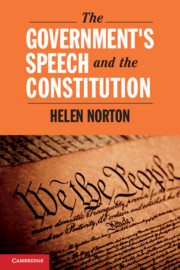Refine search
Actions for selected content:
6 results
12 - The Constitutional Exceptionalism of Religion and the Press
- from Part IV - Legal Protection for the Press Function
-
-
- Book:
- The Future of Press Freedom
- Published online:
- 25 July 2025
- Print publication:
- 24 July 2025, pp 170-181
-
- Chapter
-
- You have access
- Open access
- HTML
- Export citation
11 - Reinvigorating the Press Clause Through Negative Theory
- from Part IV - Legal Protection for the Press Function
-
-
- Book:
- The Future of Press Freedom
- Published online:
- 25 July 2025
- Print publication:
- 24 July 2025, pp 161-169
-
- Chapter
-
- You have access
- Open access
- HTML
- Export citation
2 - The Press and American Democracy
- from Part II - Democracy and the Press Function
-
-
- Book:
- The Future of Press Freedom
- Published online:
- 25 July 2025
- Print publication:
- 24 July 2025, pp 17-27
-
- Chapter
-
- You have access
- Open access
- HTML
- Export citation
17 - From Bloggers in Pajamas to the Gateway Pundit
- from Part V - Identifying Performers of the Press Function
-
-
- Book:
- The Future of Press Freedom
- Published online:
- 25 July 2025
- Print publication:
- 24 July 2025, pp 271-297
-
- Chapter
-
- You have access
- Open access
- HTML
- Export citation
5 - The Government’s Speech, Free Speech, and a Free Press
-
- Book:
- The Government's Speech and the Constitution
- Published online:
- 12 August 2019
- Print publication:
- 22 August 2019, pp 156-182
-
- Chapter
- Export citation

The Government's Speech and the Constitution
-
- Published online:
- 12 August 2019
- Print publication:
- 22 August 2019
